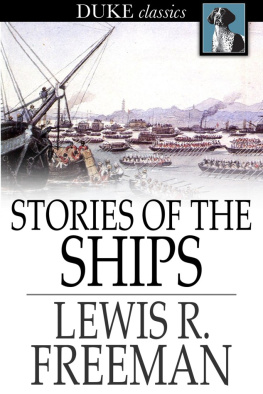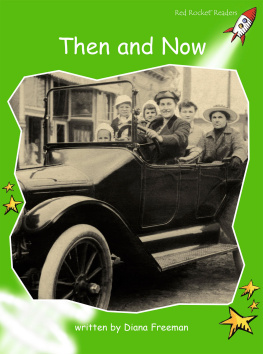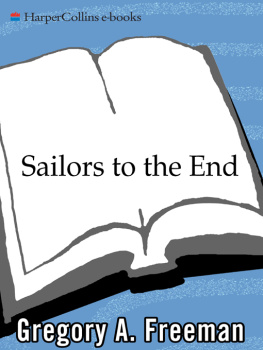STORIES OF THE SHIPS
* * *
LEWIS R. FREEMAN
*
Stories of the Ships
First published in 1919
ISBN 978-1-63421-082-9
Duke Classics
2014 Duke Classics and its licensors. All rights reserved.
While every effort has been used to ensure the accuracy and reliability of the information contained in this edition, Duke Classics does not assume liability or responsibility for any errors or omissions in this book. Duke Classics does not accept responsibility for loss suffered as a result of reliance upon the accuracy or currency of information contained in this book.
Contents
*
*
DEDICATED
TO
CAPT. ELLERTON
STORIES OF THE SHIPS
BY
LIEUT LEWIS R. FREEMAN, R.N.V.R.
OFFICIAL PRESS REPRESENTATIVE WITH THE GRAND FLEET
LONDON
JOHN MURRAY, ALBEMARLE STREET, W.
1919
I - STORIES OF THE SHIPS
*
The Story of the Cornwall
*
I. PLYMOUTH TO THE FALKLANDS
Of the countless stories of naval action which I have listened to in thecourse of the months I have spent with the Grand Fleet, I cannot recalla single one which was told as the consequence of being asked for withmalice aforethought. I have never yet found a man of action who wasenamoured of the sound of his own voice raised in the recital of hisown exploits, and if there is one thing more than another calculatedto throw an otherwise not untalkative British Naval Officer into astate of uncommunicativeness, in comparison with which the traditionalsilence of the sphinx or the proverbial close-mouthedness of the clamare alike sheer garrulity, it is to ask him, point blank, to tell you(for instance) how he took his submarine into the Baltic, or what hisdestroyer did at Jutland, or how he fought his cruiser at Dogger Bank,or something similar.
The quiet-voiced but always interesting and often dramatic recitalsof such things as these which I have heard have invariably been ledup to quite incidentallyat dinner, on the bridge or quarter-deck,around the wardroom fire, or through something else that has just beentold. Several times I have found in officers' diarieslittle recordsnever meant for other eyes than those of the writers' own friendsor familieswhich have been turned over to me to verify some pointregarding which I had inquired, laconic references to incidents andevents of great human and even historic interest, and one of the mostamusing and dramatic yarns I have ever listened to was told me in a"kite" balloonplunging in the forty-mile wind against which it wasbeing towed like a hooked salmonby a man who had assured me before wewent up that nothing really exciting had ever fallen to his experience.
It was in this wayan anecdote now and then as this or that incidentof the day recalled it to his mindthat Captain came to tell methe story of the Cornwall during those eventful early months of thewar when he commanded that now famous cruiser. He mentioned her first,I believe, one night in his cabin when, referring to a stormy midwintermonth, most of which had been spent by his Division of the Grand Fleeton some sort of work at sea, I spoke of the "rather strenuous interval"we had experienced.
"If you think life in a battleship of the Grand Fleet strenuous,"laughed the Captain, extending himself comfortably in his armchairbefore the glowing grate, "I wonder what you would have thought of thelife we led in the old Cornwall. Not very far from a hundred andtwenty thousand miles of steaming was her record for the first two yearsof the war, and in that time she ploughed most of the Seven Seas andcoasted in the waters of all but one of the Six Continents. Always onthe lookout for something or other, coaling as we could, provisioning aswe mightlet me tell you that coming to the Grand Fleet after that (atleast until a few months had elapsed and the contrast wore off) was likeretiring on a pension in comparison."
He settled himself deeper into the soft upholstery, extended hisfeet nearer the fire, lighted a fresh cigar, and, in the hour whichelapsed before the evening mail came aboard, told me of the work of theCornwall in those first chaotic weeks of the war which preceded thebattle of the Falklands.
"We were at Plymouth when the war began," said he, "and our first workwas in connexion with protecting and 'shepherding' safely to portseveral British ships carrying bullion which were still on the highseas. It was a baffling sort of a job, especially as there were two orthree German raiders loose in the North Atlantic, the favourite ruseof each of which was to represent itself as a British cruiser engagedin the same benevolent work the Cornwall was on. Warned of these'wolves-in-shepherds'-clothing,' the merchantmen we sought to protectwere afraid to reveal their whereabouts by wireless, the consequencebeing that our first forerunning efforts to safeguard the seas resolvedthemselves into a sort of marine combination of 'Blind-Man's Buff' and'Hide-and-Seek,' played pretty well all over the Atlantic. All the shipswith especially valuable cargoes got safely to port ultimately, thoughnone of them, that I recall, directly under the wing of the Cornwall.It was our first taste of the 'So-near-and-yet-so-far' kind of lifethat is the inevitable lot of the cruiser which essays the dual rle of'Commerce Protector' and 'Raider Chaser.'
"After a few hours at 'Gib,' we were next sent across to Casa Blanca,where the appearance of the Cornwall was about the first tangibleevidence that French Africa had of the fact that England was reallycoming into the war in earnest. There was a good deal of unrest inMorocco at the time, for the Germans were even then at work upon theirinsidious propaganda among the Moslems of all the colonies of theAllies. The 'buzz' in the bazaars that the appearance of a Britishwarship started must have served a very useful purpose at this criticaljuncture in carrying to the Arabs of the interior word that France wasnot going to have to stand alone against Germany. Our reception by boththe French and native population of Casa Blanca was most enthusiastic,and during all of our stay a cheering procession followed in the wake ofevery party of officers or men who went ashore.
"Leaving Casa Blanca, we were sent back to the Atlantic to search forcommerce destroyers, ultimately working south by the Canaries and CapeVerde Islands to South American waters, where the Karlsruhe was thenat the zenith of her activities. The chase of this enterprising andelusive raider, whose career was finally brought to an inglorious end byher going aground on a West Indian Island, kept the Cornwallalongwith a number of other British cruiserssteadily on the move, untilthe ominous and painful news of the destruction of Craddock's fleet offCoronel suddenly brought us face to face with the fact that there wassoon going to be bigger game than a lone pirate to be stalked.
"We never had the luck to sight even so much as the smoke ofthe Karlsruhe, althoughas I only learned too late to takeadvantage of the informationthe Cornwall was within an houror two's steaming of her on one occasion. I did think we had heronce, thougha jolly amusing incident it was, too. I was gettinguncomfortably short of food at the timea very common experience in the'here-to-day-and-gone-to-morrow' sort of life we were leading;so thatwhen the welcome news reached me by wireless one morning that a BritishshipBuenos Aires to New York with frozen beefwas due to pass throughthe waters we were then patrolling, I lost no time in heading over tointercept her on the chance of doing a bit of marketing.













